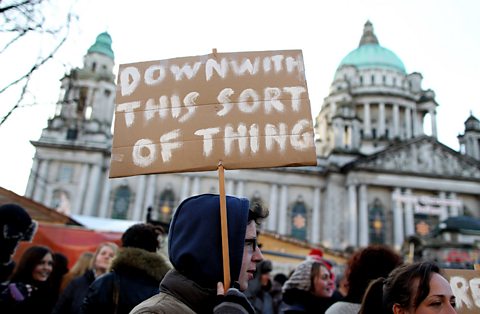Quick version
Individuals can participate in politics in a number of ways:
- vote - in the UK, everyone aged 18 or over can vote for a representative at the UK Parliament
- express opinion - freedom of speech allows people to give their views in person and through social media
- petition - petitions with 100,000 signatures, published on the UK Government and Parliament website, will be considered for debate in Parliament
- protest - taking part in demonstrations, marches and boycotts may have an impact through numbers involved
- join political group - joining a political party or pressure group allows you to work with others towards common goals
- stand as a candidate - becoming a representative allows direct involvement with decision making
Learn in more depth
People in the UK aged 18 or over can vote in elections to the UK Parliament.
In Scotland, everyone aged 16 years or over can vote in elections to the Scottish Parliament and to local councils.
Voting lets people have their say on which politicians represent them. This can be based on an individual candidate or the political party they represent.
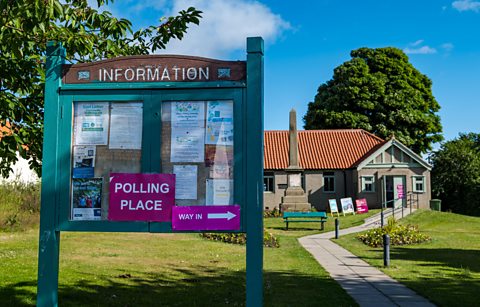 Image source, Sally Anderson News / Alamy
Image source, Sally Anderson News / AlamyPeople vote or choose not to vote for different reasons:
| why people vote | why people don't vote |
|---|---|
| they like a particular candidate or political party | they don't like/trust any candidates or parties |
| they want to make their voice heard | they don't feel represented |
| they feel strongly about a particular issue | they don't feel informed about issues |
| they feel they can make a difference | they think their vote won't count |
| they feel it is their duty to take part in the democratic process | they feel free not to take part |
What is the voter turnout for UK General Elections?
The table below shows voter turnout for UK General Elections based on percentage of people who have registered to vote.
| Election | Voter turnout (Scotland) | Voter turnout (UK) |
|---|---|---|
| 2024 | 59.2% | 59.7% |
| 2019 | 68.1% | 67.3% |
| 2017 | 68.7% | 69.0% |
| 2015 | 71.1% | 66.2% |
| 2010 | 63.8% | 65.1% |
In general, UK General Elections achieve a higher voter turnout than Scottish Parliament elections.
Voter turnout in UK General Elections is significantly lower than a record turnout of 84% in 1950.
While the voter turnout in 2024 was 59.7% of those registered to vote, a report by the Institute for Public Policy Research puts this figure at just 52% of the UK adult population.
Measured in this way, this represents the lowest turnout since universal voting for those aged 21 or over was introduced in 1928.
How can individuals participate by expressing their opinion?
People can express their opinions by speaking up in person or through media, particularly social media.
They can do this in a number of ways, each of which has benefits and limitations.
| method | limitations |
|---|---|
| talking about issues with family, friends and other people in daily life | personal influence is limited to the people you know or come into contact with |
| attending public meetings and ask questions or make points | your ability to take part in public meetings is limited by where and when they take place |
| raising an issue with a political representative, eg attending MP's surgery, writing to MP, engaging with MPs on social media | MPs need to balance any issues raised with them with their party policies and the interests of other constituents |
| discussing issues on social media | social media might only reach an 'echo chamber' of people who already have similar views |
Online activism is popular with many people using the internet or social media to organise protests or change popular opinion about a range of issues.
How can individuals participate through petitions?
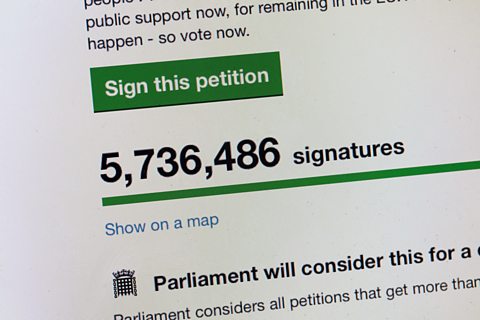 Image source, Ink Drop / Alamy
Image source, Ink Drop / AlamyStarting a petition or adding your name to a petition is one way to show your view on a particular issue.
A petition does not have to reach a certain number of signatures to be considered. This means individuals don't have to share their view with a large number of people to make a difference.
Taking part in a petition has limited power:
- petitions to the UK Parliament need to gain 100,000 signatures to be debated in the House of Commons
- petitions to the Scottish Parliament can only result in action on devolved matters
 Image source, Ink Drop / Alamy
Image source, Ink Drop / AlamyHow can individuals participate by protesting?
Individuals can participate by protesting:
- attending public marches or demonstrations
- boycotting institutions, companies or products
- taking part in illegal protest activities
The power of protests is limited
- many people need to be involved in a protest for it to be noticed
- protests won't bring about change unless they lead political representatives (or institutions) to take action
- the actions of protestors may be counterproductive - disruptive or illegal action may turn people against a group or cause.
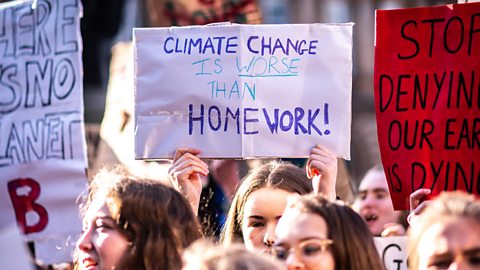 Image source, Andy Catlin / Alamy
Image source, Andy Catlin / AlamyHow can individuals participate by joining a political group?
Individuals can participate by becoming involved with a political party.
- making a donation - giving money to a party can show your support without having to invest time
- joining - anyone can join a political party for a small fee.
- party members can take part by helping to select their local MP and voting for their party leader
- campaigning - showing a party poster, canvasing for votes and taking part in events are all ways to support a candidate
An individual's power in a political party is limited - although members can try to influence party policy, if their views disagree with with the party's official position, they must either accept it or choose to leave the party.
How has political party membership changed?
How has membership of political parties changed over time?
According to the UK Parliament site, at their peak in the 1950s, there were around 2.8m Conservative Party members and 1m Labour Party members.
Since then membership of political parties has generally declined, reaching a historic low in 2013.
Since then membership of the Conservative, Labour and the Liberal Democrat parties has increased from around 0.8% of the electorate in 2013 to around 1.5% of the electorate in 2022.
SNP membership increased from 0.6% of the electorate in Scotland in 2013 to around 3% in 2018, before falling to around 1.7% by March 2023.
People may choose to join a pressure group
- this allows people to join together to campaign on a particular issue or group of issues
- joining an insider pressure group can help them influence representatives directly, through working together and lobbying
- joining an outsider pressure group can raise awareness about an issue and may bring change through influencing public opinion
Participating in a pressure group brings limited power:
- pressure groups can only influence representatives and decision makers - they can't bring about change directly
- each group will only deal with a specific issue or group of issues - this may not include every issue an individual cares about
How can individuals participate by standing as a candidate?
Individuals can participate by standing as a candidate for election.
This brings the opportunity of being directly involved in political decision making.
- most candidates are members of political parties
- party candidates must gain the support of their party to stand
- they are expected to support party policies, even if they disagree with some of them
It is possible to stand as an independent candidate
- most people vote for party candidates rather than individual independents
- independents need to compete with organised parties with campaign funding
- independents often campaign on a single issue - this needs to be important to a number of voters to stand a chance of election
Anyone standing as a candidate needs to win over a significant number of voters.
Test what you have learned
Quiz
Recap what you have learned
Individuals have many ways to participate in democratic political life. All have benefits and limits.
| method | benefit | limit |
|---|---|---|
| vote | direct say in who represents you | you may be outnumbered by other voters |
| express opinion | easy to give views in person/on social media | may reach limited audience |
| petition | petitions on UK Parliament's petition site considered by MPs | must have 100,000 signatures or more |
| protest | may have influence through numbers involved | can only influence decision makers, not make direct change |
| join political group | can work with others towards common goals | individual power could be limited and may have to accept overall party/group position |
| stand as a candidate | if elected can be directly involved in decision making | need to win enough votes for election |
More on Democracy in the UK
Find out more by working through a topic
- count9 of 14
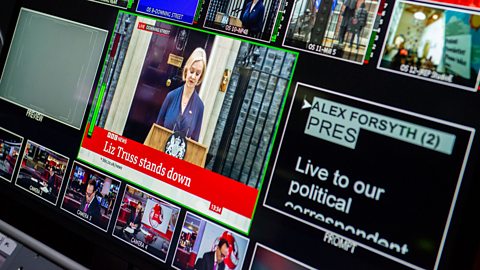
- count11 of 14
